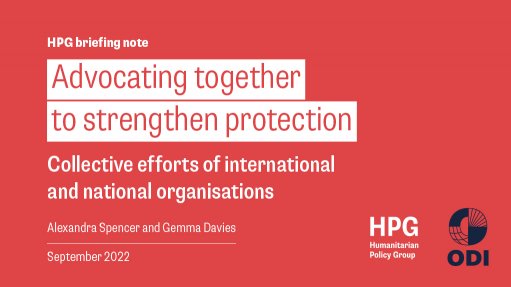
Advocacy is a well-recognised tool to strengthen the protection of people in crisis. The added value of collective efforts is demonstrated by the complementary roles that a range of stakeholders undertake, thereby leveraging their comparative advantages. Current practice on advocacy approaches is varied and dependent on multiple factors. HPG research indicates that while mobilisation and persuasion are regularly used, denunciation is the most commonly used approach by international organisations.
This briefing note sets out to collate examples of international and national humanitarian actors engaging in collaborative advocacy efforts. It outlines the roles different actors play in advocacy partnerships as well as the factors that enable and challenge actors working together to advocate on matters of protection. It aims to highlight elements of good practice and suggest opportunities for change. This paper builds on the findings of HPG’s report on complementary advocacy approaches between international and local and national humanitarian actors.
This briefing note is informed by a desk review, a survey of humanitarian actors, and two roundtables with local and national actors as well as a limited number of interviews. It was directly informed by the perspectives of individuals from and working in a diverse range of crisis-affected countries including Bangladesh, Colombia, the Democratic Republic of the Congo, Guatemala, Honduras, Kenya, Lebanon, Pakistan, Palestine, the Philippines, Somalia, South Sudan, Syria, Uganda and Yemen.
There are a set of recommendations for remedying the challenges involved in collective advocacy, aimed at international and national humanitarian actors, as well as donors.
Report by the Overseas Development Institute